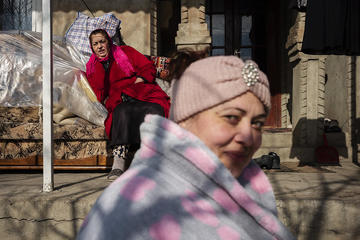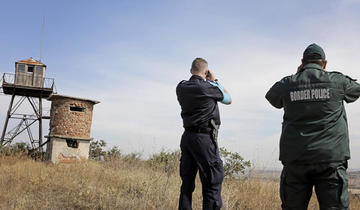The Parliament of Rights - 3rd edition aims at contributing to a better understanding of the role of the European Parliament, as the only institution directly elected by European citizens, in the democratic life of the Union, in defining European policies for fundamental rights, and on crucial matters for the future of our continent such as climate, the environment, migration, and digital. In this complex moment for our continent, now is the time to imagine post-pandemic Europe. We will be doing this by promoting an informed, open, and plural public debate that will involve MEPs, experts, journalists, students, teachers, and policymakers in debates, seminars, and workshops. We thus intend to make our contribution to the participation of citizens in the European decision-making process and civil society’s capacity for action at the transnational level, which is essential for relaunching the European project from below and promoting a Europe of rights.
DISCRIMINATIONS Ukrainian Roma refugees are not welcome everywhere across Europe
Cassandre Thomas | 29/6/2022About 100,000 refugees fleeing from Ukraine to Europe are estimated to be Roma. They are particularly vulnerable, and yet appear to suffer from discrimination in at least some European countries, such as Czechia and Moldova
DIGITAL EU: new transparency rules for online platforms
Federico Caruso | 26/5/2022With the Digital Services Act, the European Union aims to establish new standards on the obligations and responsibilities of social networks and other large platforms in the management of problematic content. The result is the outcome of an ongoing dialogue between the Commission, Parliament, and the Council, with the involvement of civil society
EUROPEAN PARLIAMENT The EU's energy dependence, between gas and nuclear power
Ornaldo Gjergji | 13/4/2022Gas and nuclear as green energy? The European Parliament may not agree and reject the taxonomy proposed by the European Commission
In its role as co-decision-maker, the European Parliament is called upon to express itself on the New Pact on Migration and Asylum proposed by the EU Commission. The challenge is to strengthen solidarity between states in creating a common system that respects the fundamental rights of asylum seekers
RIGHTS Human rights violations: Frontex knew and did not react
Giulia Bassetto, Rossella Vignola | 19/7/2021The European Parliament published its report on the work of Frontex and the violations of the rights of migrants. Numerous issues were highlighted
INTERVIEW Majorino: shared responsibility is needed on the rights of migrants
Rossella Vignola | 21/5/2021With the suspension of the Frontex budget and the launch of a parliamentary commission to shed light on alleged human rights violations in illegal pushbacks at European borders, the European Parliament affirms the political will to acknowledge the rights of migrants. We talked about it with MEP Pierfrancesco Majorino
CURRENT EVENTS MEPs, migrants, and the Croatian police: tensions at the Croatian-Bosnian border
Zagreb | Giovanni Vale | 3/2/2021On Saturday 30 January, on the border between Croatia and Bosnia and Herzegovina, the Croatian police blocked a group of Italian MEPs – an event that highlights how explosive the situation is and how much the solution can only be a European one
The Green deal is at the heart of the COVID-19 recovery plan, as requested by the European Parliament. The fight against climate change, protection of biodiversity and forests, clean energy, and circular economy are priority issues on the agenda of the EP which, in 2019, approved a resolution declaring the climate emergency
EUROPEAN PARLIAMENT The EU's energy dependence, between gas and nuclear power
Ornaldo Gjergji | 13/4/2022Gas and nuclear as green energy? The European Parliament may not agree and reject the taxonomy proposed by the European Commission
EU The new common agricultural policy: green or greenwashing?
Ornaldo Gjergji | 5/10/2021After almost two years of negotiations, last June the European Parliament and the Council reached an agreement for the reform of the Common Agricultural Policy (CAP), with several novelties and strong criticisms
ENVIRONMENT Climate: is the EU plan ambitious enough?
Giulia Bassetto | 3/8/2021The European Commission has presented the new package of climate proposals to the European Parliament: the goal is to reduce greenhouse gas emissions by at least 55% by 2030 compared to 1990 levels and achieve full climate neutrality by 2050
ENVIRONMENT North Macedonia, recycling remains a mirage
Tetovo | Aleksandar Samardjiev | 4/6/2021Despite some success stories, recycling remains at extremely low levels in North Macedonia. According to experts and observers, the country needs to quickly develop a waste management strategy
ENVIRONMENT Covid-19: the plastic pandemic
Marco Ranocchiari | 28/4/2021In Europe, the period 2020-2021 was to mark the turning point in the fight against plastic waste, one of the most urgent problems of our century. Then came the new Coronavirus: with masks, gloves, and anti-contagion packaging, the risk of a step back is increasingly concrete
In the post-COVID world, the EU will find itself leading the responses to the global challenges we face. Strengthening multilateralism, combating climate change, unambiguously managing relations with autocracies, and advancing the Enlargement process are just some of the issues that the European Parliament will face in its role of fostering political dialogue and democratic control of common foreign policy
EUROPE EU: enlargement to the east is back on the agenda
Lorenzo Ferrari | 10/3/2022Ukraine, Georgia, and Moldova have officially applied to join the European Union. The first reactions have been positive, but it will be a long process: in the meantime, however, the enlargement of the EU could finally get going again, and some novel solutions could be tested
MEPs wrote to Borrell and Schmidt, express concerns over tensions in BiH
Redazione | 25/10/2021A group of European Parliament members wrote to High Representative Josep Borrell and High Representative for Bosnia and Herzegovina Christian Schmidt, expressing concern over the latest escalation of tensions in BiH
POLITICS Slovenia no limits
Stefano Lusa | 20/10/2021Relations between Ljubljana and Brussels are increasingly tense. Janez Jansa, Prime Minister of Slovenia, shows no bounds in provoking the European Union. He demonstrated this during the recent visit of a European Parliament delegation that came to Slovenia to assess the situation of the rule of law
INTERVIEW Castaldo: Western Balkans, the beating heart of the EU
Paolo Bergamaschi | 19/5/2021"The Western Balkans are not and must never be a defeated periphery of the West, but they are and must remain the beating heart of the present and future of the great European family". Interview with Fabio Massimo Castaldo, Vice President of the European Parliament
POLITICS Georgia: the EU speaks out on the political crisis
Marilisa Lorusso | 14/4/2021The political impasse in Georgia continues despite two attempts at mediation by the EU institutions. The European Parliament warns: European aid only if the parties resolve the crisis
COMMENT Balkans in the EU: a future to be designed together
Paolo Bergamaschi | 9/4/2021The European Parliament seems much more inclined to open up to the Western Balkans than the Commission and the Council, and recently requested to include these countries in the Conference on the Future of Europe which will open on 9 May
EUROPEAN UNION European Parliament and the Western Balkans: I wish I could
Željko Pantelić | 26/3/2021In the plenary session of yesterday, 25 March, the European Parliament passed resolutions on Albania, Kosovo, North Macedonia, and Serbia in an enlargement perspective. But many important representatives were absent from the parliamentary debate
ANALYSIS Serbia between China and Europe
Belgrade | Vukašin Obradović | 26/2/2021China’s influence in Serbia is growing. In its recent report, the European Parliament expressed concern about the lack of transparency and environmental and social impact assessment of Chinese investments and loans in Serbia and across the Western Balkans
In times of technological developments of great magnitude, increasing importance of our digital identities, risks and opportunities linked to surveillance, and changes within the media and journalism sphere, the European Parliament is a privileged forum for discussing the challenges posed by digital transformation to rights and democracy: the place for a debate on the virtual world where we and the future generations will live
DIGITAL EU: new transparency rules for online platforms
Federico Caruso | 26/5/2022With the Digital Services Act, the European Union aims to establish new standards on the obligations and responsibilities of social networks and other large platforms in the management of problematic content. The result is the outcome of an ongoing dialogue between the Commission, Parliament, and the Council, with the involvement of civil society
EUROPEAN PARLIAMENT Surveillance and abuse: a European Parliament inquiry commission to shed light on the Pegasus scandal
Rossella Vignola | 28/4/2022The European Parliament approved by a large majority the establishment of a commission of inquiry to shed light on the abuse of Pegasus and other digital surveillance tools against journalists, critical voices, and opposition figures in the countries of the European Union
MEDIA SLAPP: open dialogue with the Commission
Paola Rosà | 15/12/2021A public consultation on gag complaints is open until 10 January. In a meeting on the subject with organisations from all over Europe, which we attended on Thursday 25 November, Vice President of the European Commission Vera Jourova renewed her call for numerous contributions from all countries of the EU
EUROPEAN PARLIAMENT Citizens and democracy threatened by SLAPPs: preview of the draft resolution
Paola Rosà | 23/6/2021The CASE coalition of which OBCT is part has received the text that will be presented to the European Parliament next Monday: a commitment to defend the rule of law and public participation, which collects many suggestions and proposals from civil society organisations
Equality is one of the fundamental values underpinning the EU, which has a mandate to combat discrimination. Despite the progress made over the past twenty years on European anti-discrimination law, important legislative gaps remain. On several occasions, the EP has stressed the need to fill these gaps by asking for the adoption of a directive offering wider protection, the so-called 'horizontal directive', blocked by the Council since 2008.
DISCRIMINATIONS Ukrainian Roma refugees are not welcome everywhere across Europe
Cassandre Thomas | 29/6/2022About 100,000 refugees fleeing from Ukraine to Europe are estimated to be Roma. They are particularly vulnerable, and yet appear to suffer from discrimination in at least some European countries, such as Czechia and Moldova
RIGHTS AND EUROPE Slovenia, the European Parliament and the rule of law
Juan Torregrosa Rodriguez | 16/12/2021On 17 November, the results of a monitoring mission on the rule of law carried out in Slovenia in October by some members of the European Parliament were presented
HUMAN RIGHTS Bulgaria, lagging behind in disabled people’s rights
Juan Torregrosa Rodriguez | 2/12/2021Despite European funding and new measures undertaken by the Sofia authorities, Bulgaria lags behind in safeguarding the rights of people with disabilities who continue to experience high levels of poverty and social marginalization
together.eu is a pan-European community that encourages everybody to participate in the EU democracy
A course online offering basic knowledge of European institutions and a focus on strategies for civil society to interact with the EU decision making process
Let's the Quote Finder , a tool to explore the activity of MEPs on Twitter and participate in the European public debate. Powered by the European Data Journalism Network
News from the European Parliament
The action is co-financed by the European Union in the frame of the European Parliament (EP)'s grant programme in the field of communication. The EP is, in no case, responsible for or bound by the information or opinions expressed in the context of this action. The contents are the sole responsibility of OBC Transeuropa and can in no way be taken to reflect the views of the European Union.
































